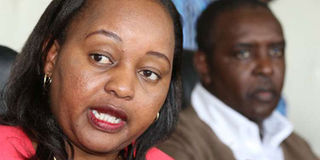Breaking News: At least 10 feared to have drowned in Makueni river
When did Uhuru know about NYS scandal? What did he do?

Former Devolution and Planning Cabinet Secretary Anne Waiguru on November 21, 2015 shortly before she announced her resignation. The question Kenyans should be asking about the NYS scandal is: What and when did Uhuru Kenyatta know about all this? And what did he do? PHOTO | WILLIAM OERI | NATION MEDIA GROUP
What you need to know:
- For a while now, a narrative has been created that suggests that Uhuru Kenyatta is deadly serious about tackling corruption.
- We know that the last presidential election was the most expensive ever in our history, with figures in the billions being bandied around, but no one knows how much Mr Kenyatta’s campaign spent on it.
- The defence of Anne Waiguru since all these issues came to light, beggars belief. Loyalty is understandable and even admirable. But only to a point, if one is serious about fighting corruption.
- While some will blame the advisers for the Justice Tunoi mess, the buck must stop at Mr Kenyatta’s desk.
- The clear reluctance and delay to appoint a credible, independent and respected tribunal only breeds speculation, especially after media reports that Justice Tunoi sought a deal with the Judicial Service Commission that was rejected.
The fascinating roadshow that is the NYS scandal is unfolding in ways that no one could have imagined.
Not the perpetrators who made off with billions, laughing, at the time, all the way to the bank.
Not the “political analysts” whose expensive advice is “talk less, listen more; bark less, bite more.”
Not the “whistle-blowers” who started off saying that no money was lost, then directly released a police report implicating junior staff and now drags in others making for a toxic mix.
And certainly not the “investigators” whose sneaky, insulting and ludicrous attempts at rehabilitation suggest that the cover-up - if not the perpetrators - goes way higher up than we have been made to think.
Why? Because to get an all-clear from the anti-corruption commission always takes more than a year, especially when one is innocent.
It scarcely helps when the same institution that gave the all-clear is now “re-investigating,” insisting that the clearance was for four, unknown, charges!
For those of us living in this Kenya, the question we should be asking is: What and when did Uhuru Kenyatta know about all this? And what did he do?
'TACKLING' CORRUPTION
For a while now, a narrative has been created that suggests that Uhuru Kenyatta is deadly serious about tackling corruption.
People who have met with him on this issue point out his passion, anger and frustration about the extent of corruption and all have left convinced that he is serious about it; often adding in the rider that, after all, his family is so wealthy that he does not need to be corrupt.
But I just don’t buy it. First, this suggests that people are corrupt out of need.
Hogwash! The most corrupt people in Kenya are precisely those who don’t need it.
In fact the idea that if we pay public officials more they will be less corrupt is balderdash.
We discovered, for example, that when remuneration for judges and magistrates was dramatically increased, the size of the bribes for judges increased exponentially.
Which is why we saw that as soon as we had well paid public officials and high priced lawyers sitting in the Judicial Service Commission, buttock (sitting) allowances shot up to Sh80,000 per sitting, meaning that many sittings were arranged to keep the buttocks warm.
CAMPAIGN MONEY
Second, we know that the last presidential election was the most expensive ever in our history, with figures in the billions being bandied around, but no one knows how much Mr Kenyatta’s campaign spent on it.
These billions were either from the family wealth, or from “well-wishers” seeking to buy influence and deals post-election.
Either way, without transparency and accountability in campaign finance, we can be sure that someone somewhere needs that funding recouped, in one way or the other.
For there is another election to be fought soon and wealthy as a candidate may be, it is not a bottomless pit, as Mr Kenneth Matiba learnt to his detriment.
This applies, of course, as much to Raila Odinga as it does to Uhuru Kenyatta.
Third, the defence of Anne Waiguru since all these issues came to light, beggars belief. Loyalty is understandable and even admirable. But only to a point, if one is serious about fighting corruption.
Rather than deny and deflect, it is crucial to look into the allegations and seek independent advice and information, especially from those making the allegations.
What was it, we must ask, that blinded Mr Kenyatta so effectively?
JUSTICE TUNOI SAGA
Fourth, there is the Justice Tunoi matter and the now-off-now-on tribunal.
While some will blame the advisers for this mess, the buck must stop at Mr Kenyatta’s desk.
Advisers simply advise, and the decision-maker decides, hopefully after reading for himself the provisions of the Constitution which we hope occupies a prominent place on his desk, meeting rooms and bedroom.
The clear reluctance and delay to appoint a credible, independent and respected tribunal only breeds speculation, especially after media reports that Justice Tunoi sought a deal with the Judicial Service Commission that was rejected.
Was this reluctance a sign that there is something to hide with regards to the Supreme Court and its infamous low quality judgment of 2013 on the elections?





